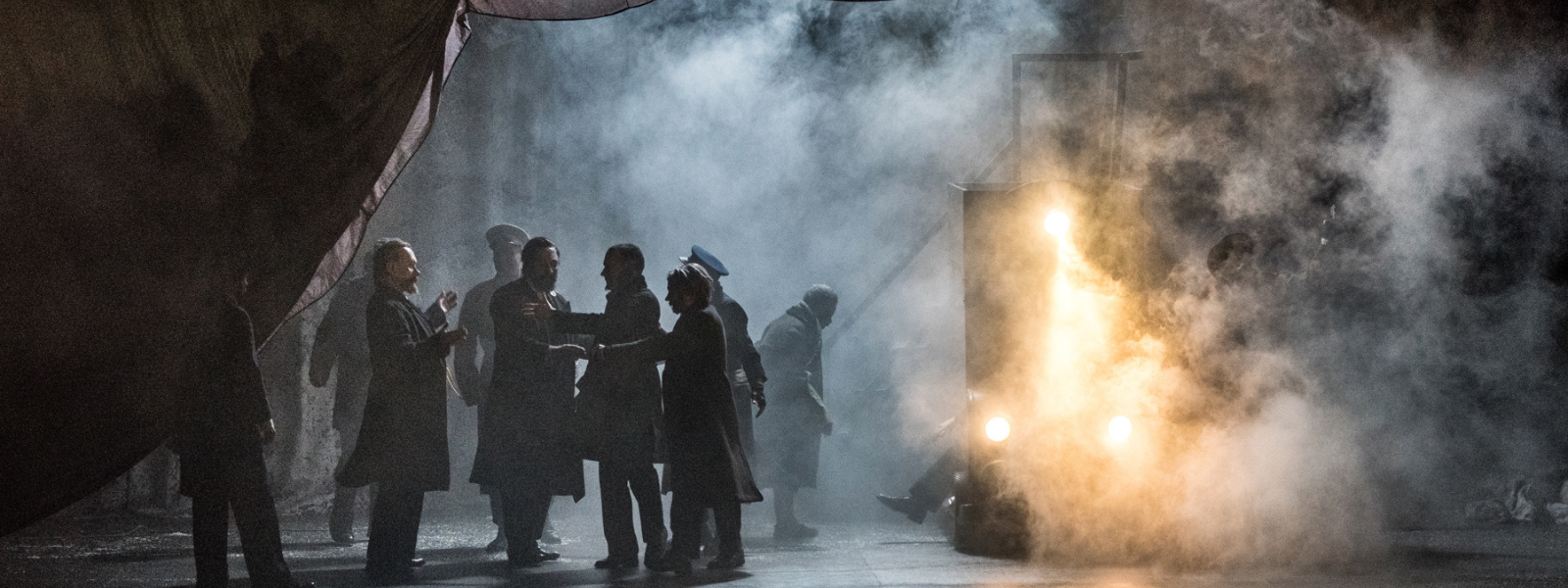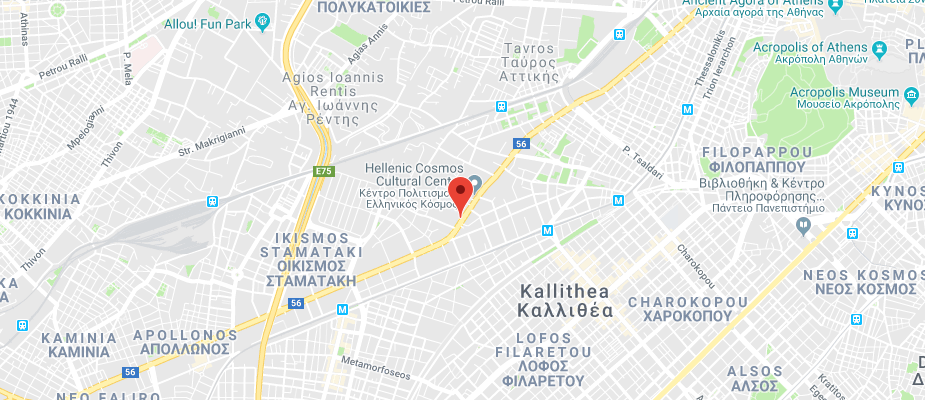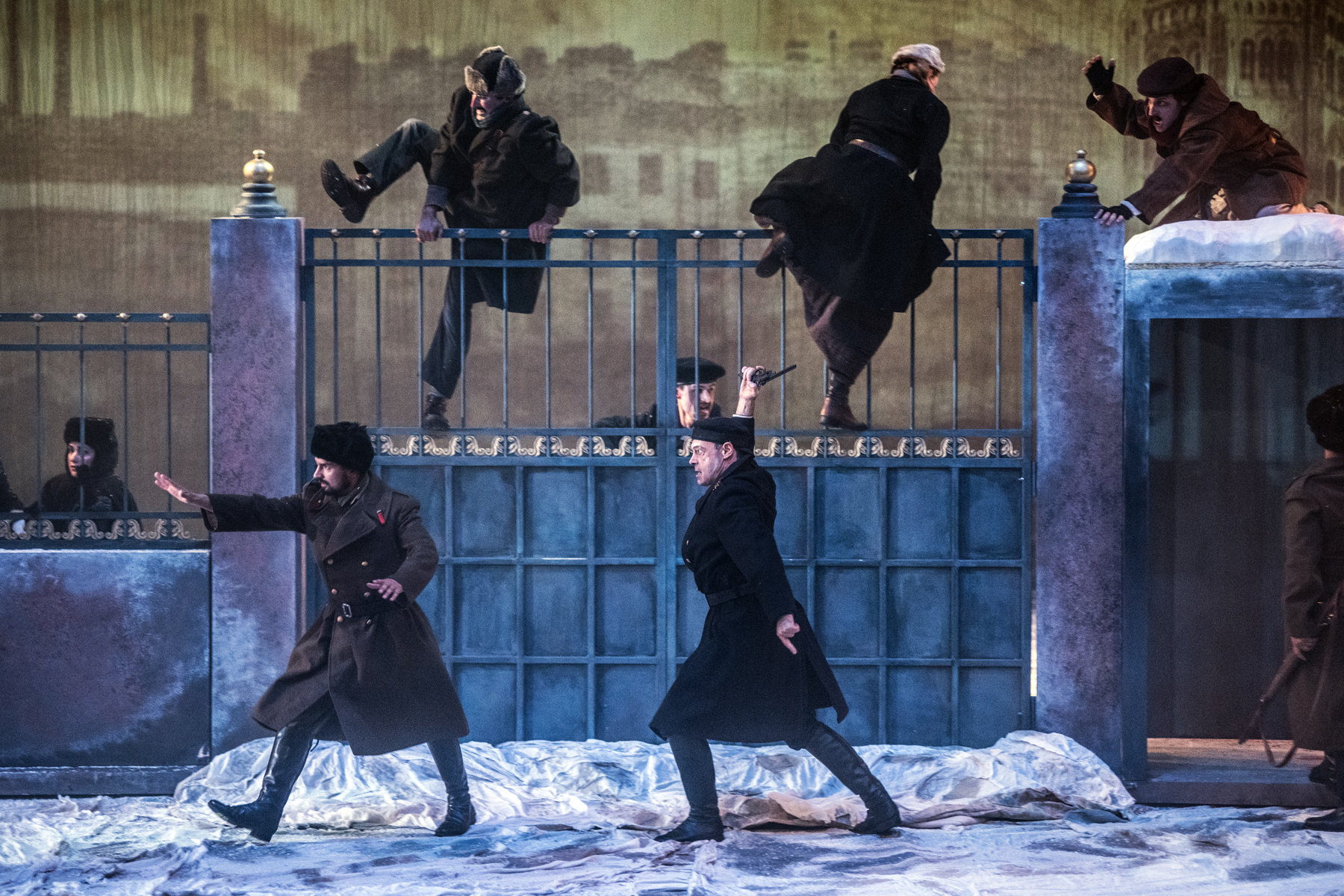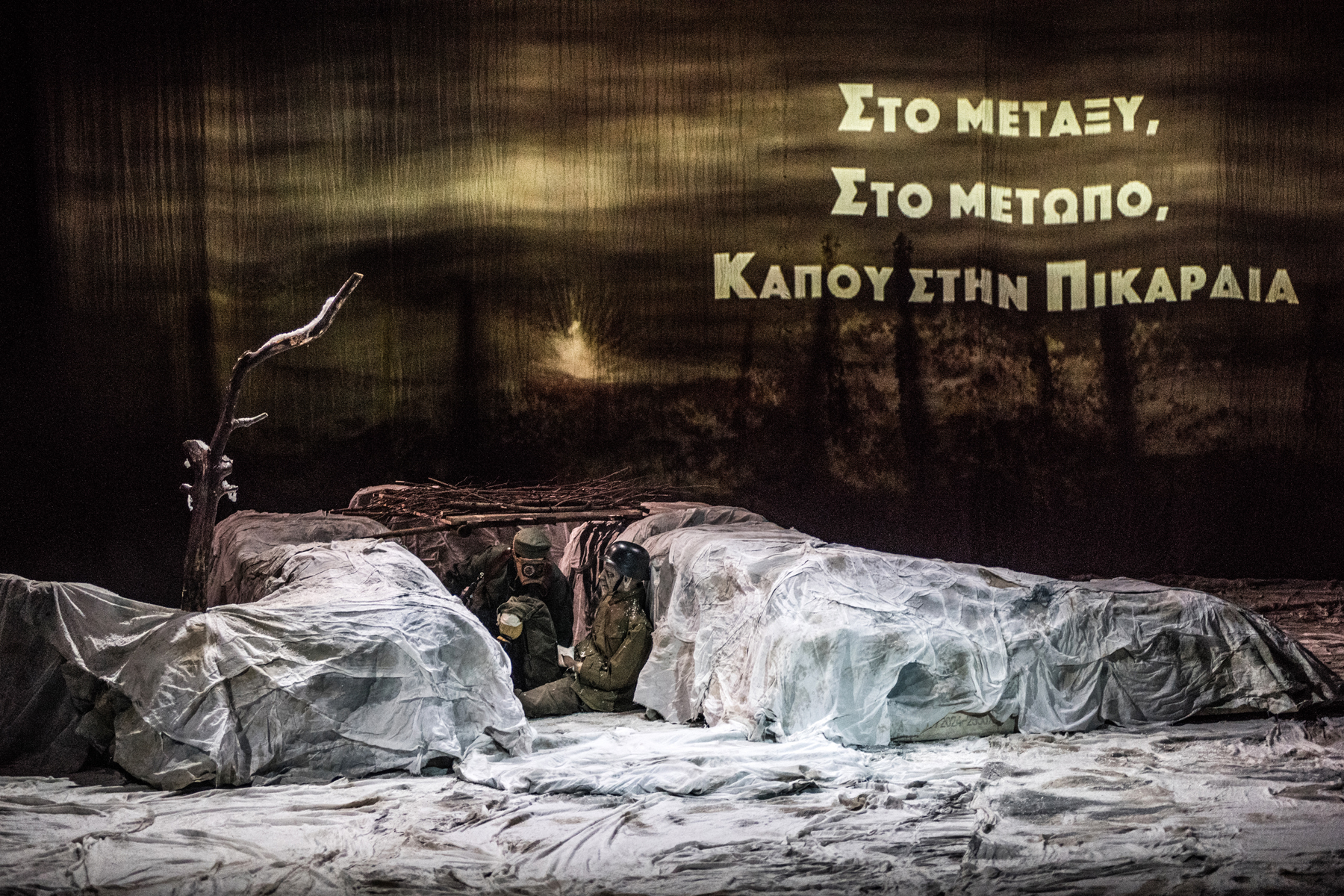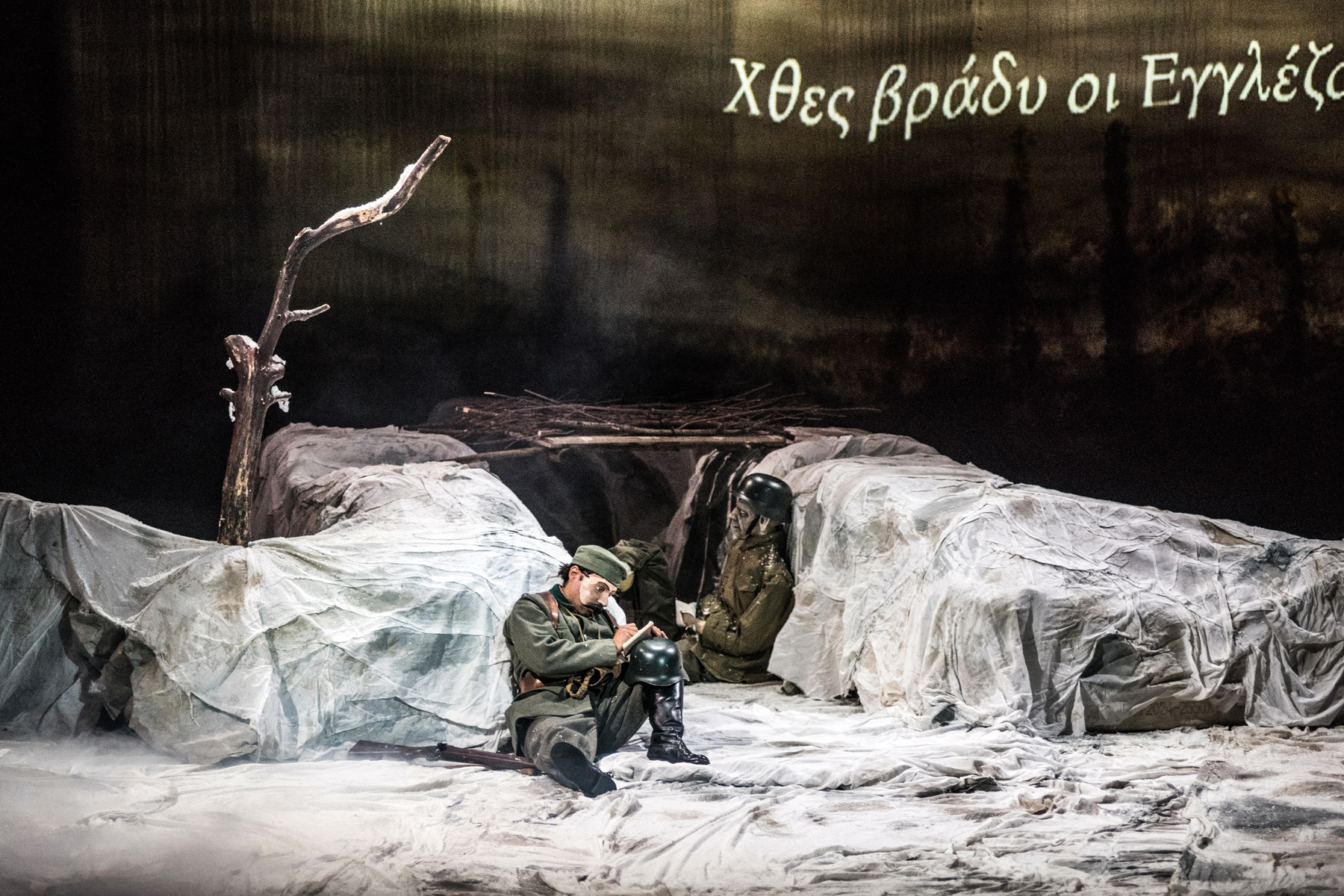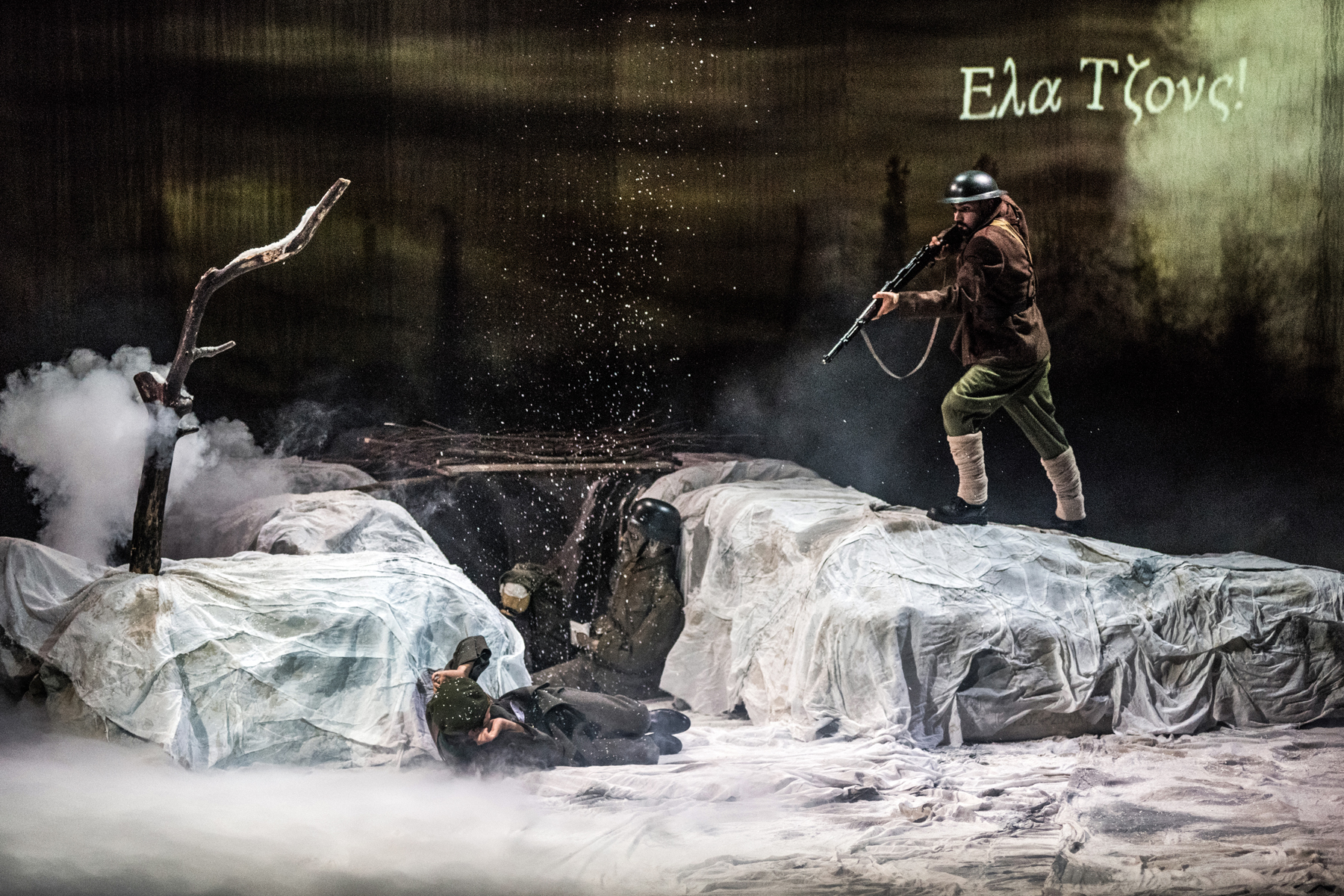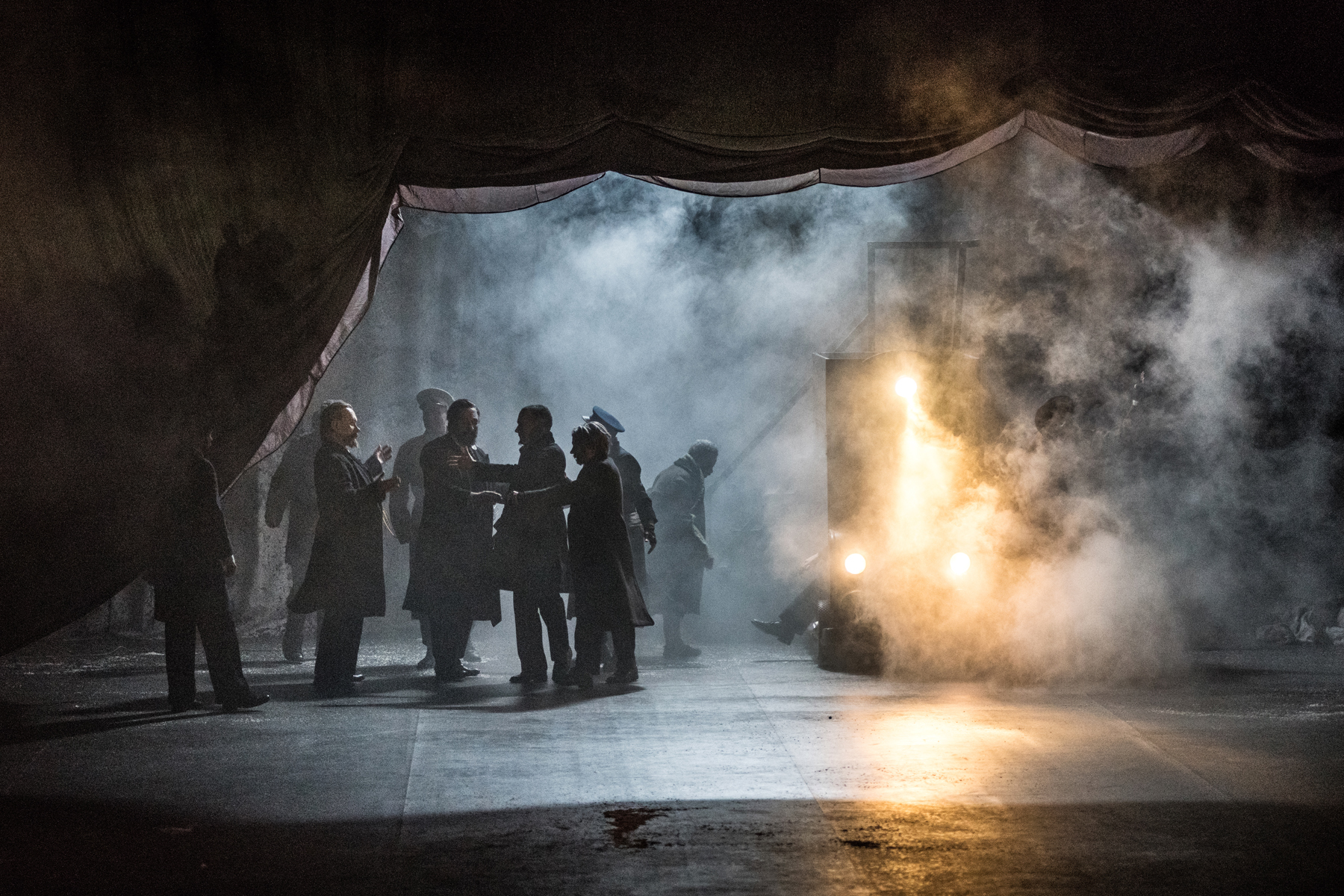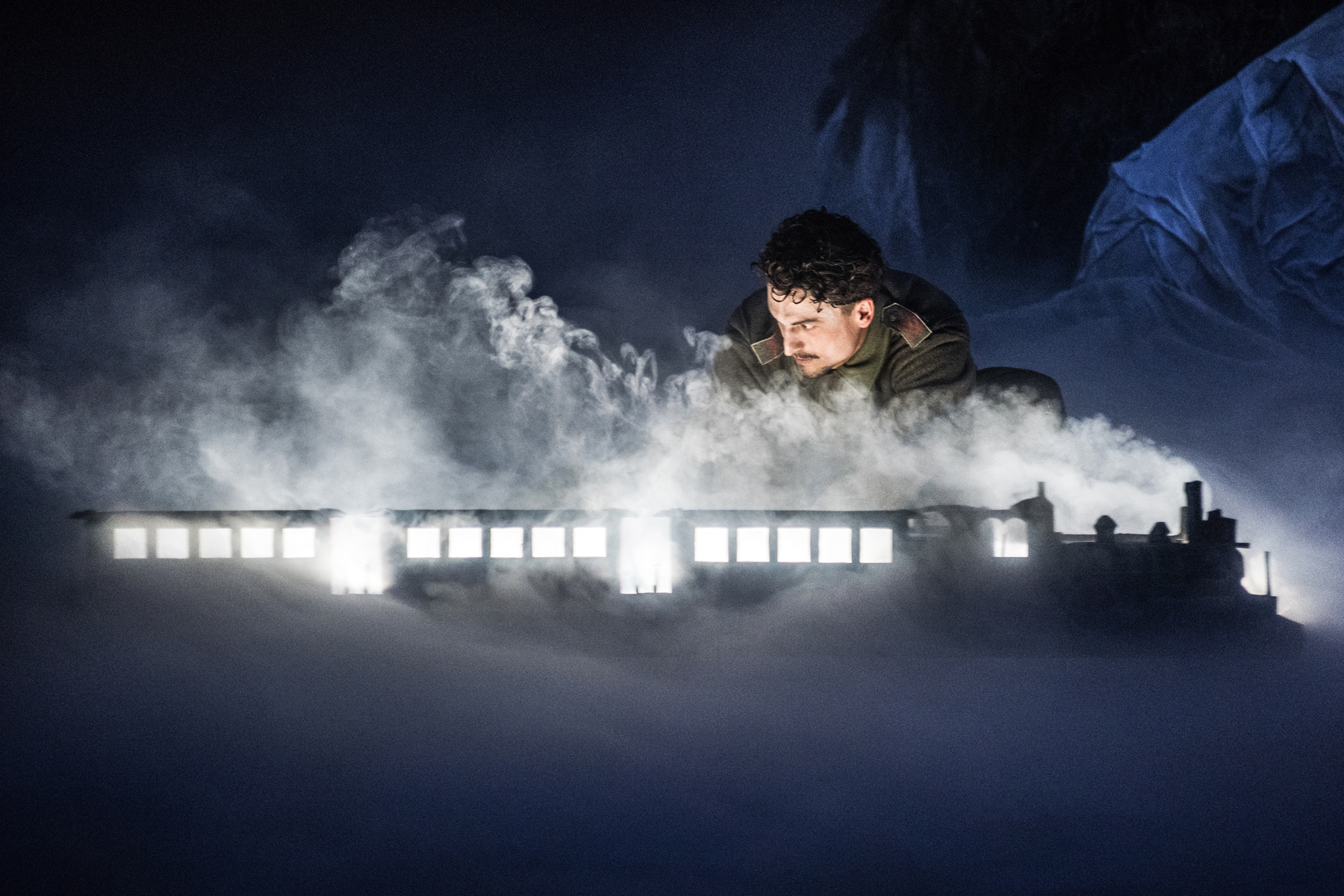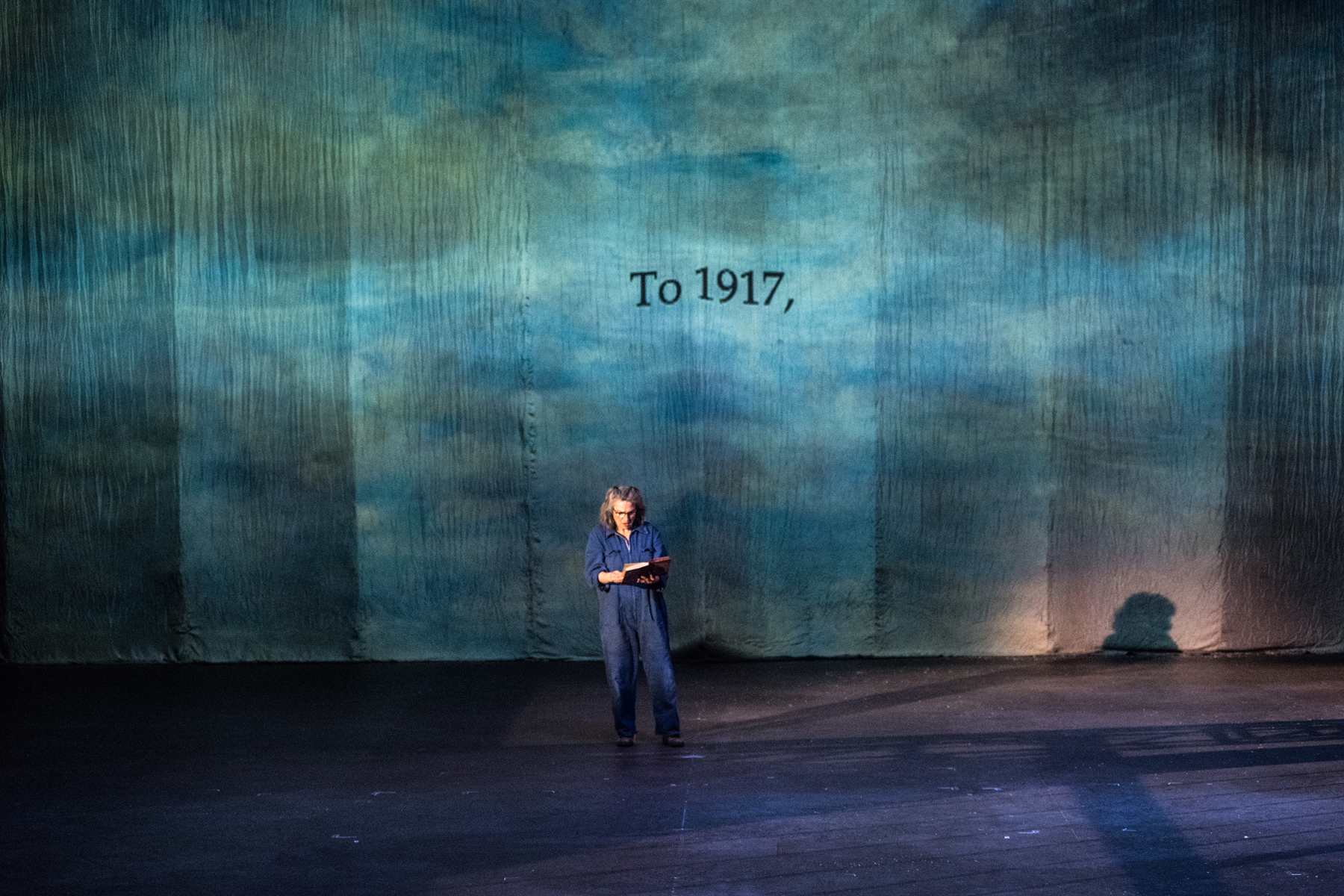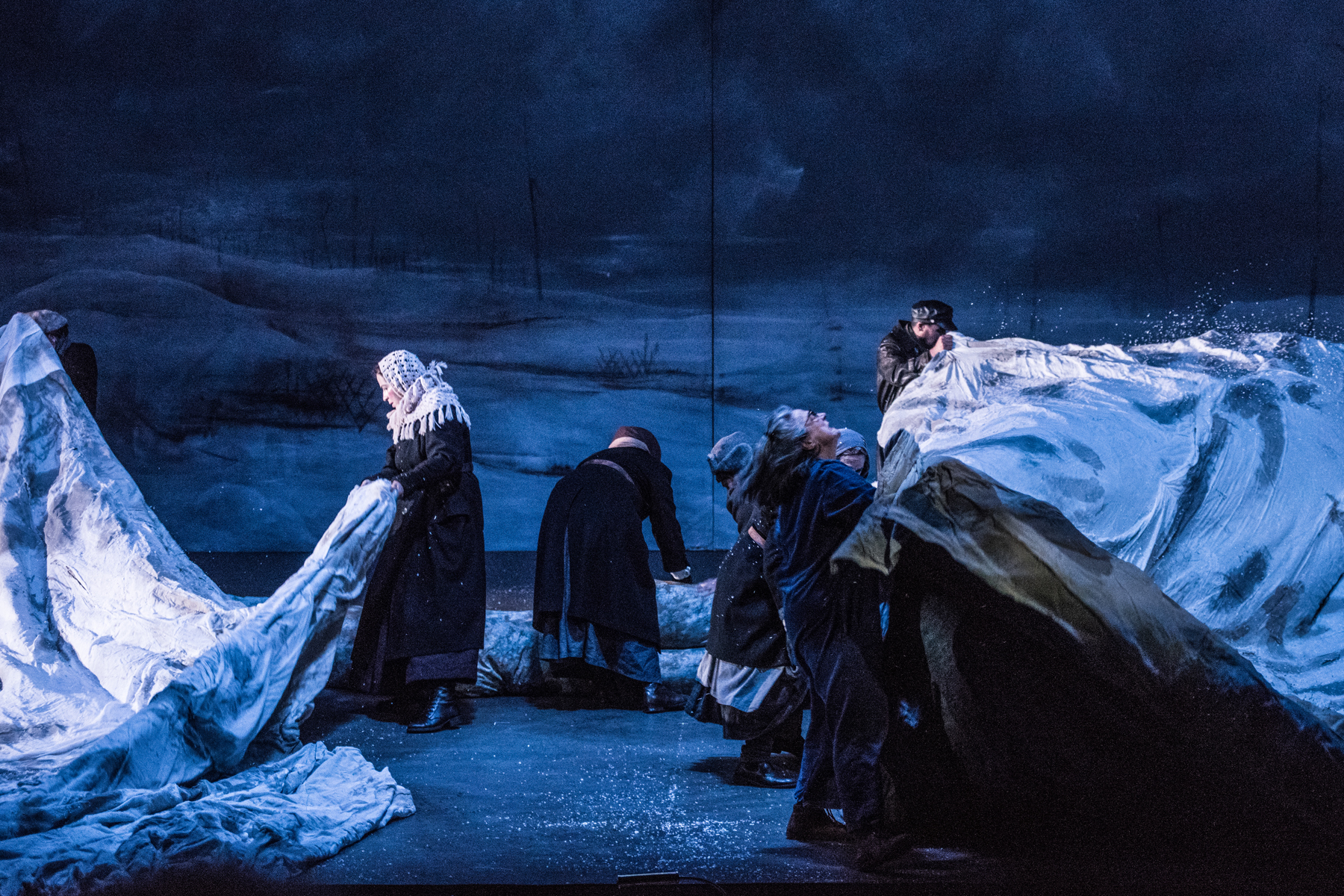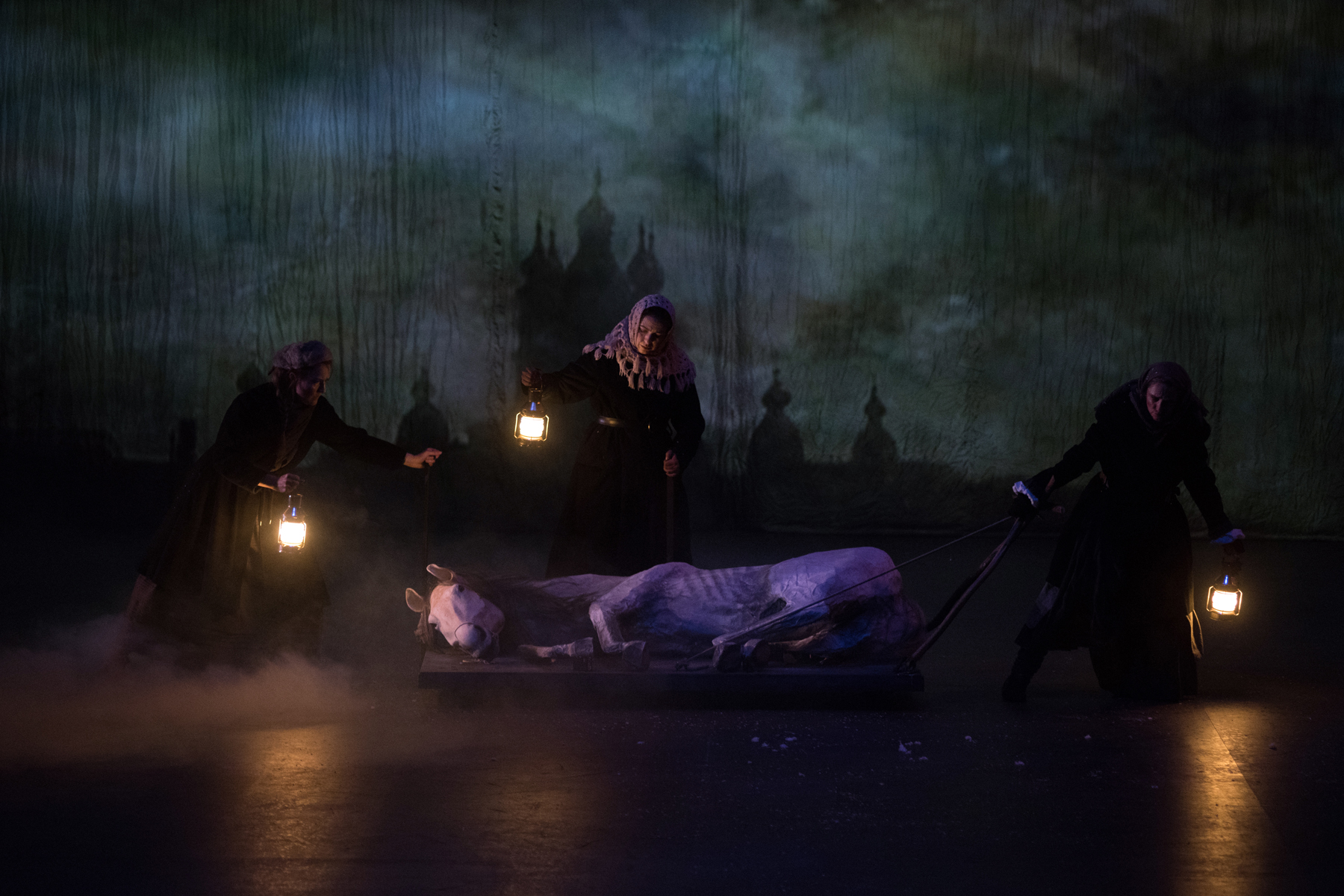First episode
1917: Victory was in our hands
Ariane Mnouchkine, one of the most beloved theatre creators of the Greek audience, needs no further introduction. Théâtre du Soleil—the legendary stage ensemble she founded in 1964 and persists tirelessly to this very day—has proven one of the most profiled and unwavering pillars of contemporary French culture, having visited the Festival numerous times with a series of collective theatrical sagas that were met with widespread acclaim. Notable examples are Le Dernier Caravansérail (2006), Les Éphémères (2007), The Castaways of the Fol Espoir (Sunrises) (2011), and Kanata – Episode I – La Controverse (2019), the sole time she has entrusted the legendary Théâtre du Soleil troupe to a guest director, the internationally celebrated Canadian Robert Lepage.
Modelled around the ideals of “a theatre for the people” (as articulated by Jean Vilar), “a political theatre” (as envisioned by Brecht), and a “celebratory theatre” as imagined during the May ’68 uprisings, Mnouchkine foremost believes in the educational merits of the theatrical deed—both for the artists and an audience that she seeks to nourish but also conceptually challenge. According to her school of thought, theatre ought to remain alert to the grand challenges of our times and reclaim a position at the forefront of social discourse. This ethos is crystalised by the choice of themes each time, as well as the modus operandi of the company that functions in a commune-like manner already from the 1960s, both on stage and away from the limelight. The Troupe and the Community are indeed here paramount: there are no leading actors, and the only true protagonist is the Chorus itself, hence the profound influences in the company’s work by Ancient Drama, Commedia dell'arte, and Street Theatre, as well as the traditions of Ritual Theatre of the East.
Elevating theatricality to a higher plateau through a unique multicultural idiom encompassing utterly diverse aesthetic references in visual presentation, chorus, and music, the company’s performances always revolve around the backbones of Myth and History, crafting narratives that illuminate the broader historical momentum. They address the local and the specific to speak of the global and the universal, harnessing to the utmost degree the entire gamut of expressive means offered by theatre: improvisation, theatre as a game, rhythm, masks and costumes, and chorality.
This admired balance is once again accomplished in their latest production, Here dwell the dragons, an epic and historical mural of a work that marks Théâtre du Soleil’s sixtieth anniversary. Beginning with the war in Ukraine, it unfolds backwards in distinct acts/seasons, with its first episode, titled 1917: Victory was in our hands, presented this year at the Festival. Featuring a cast of around forty actors who actively participate in all facets of this theatrical production, the performance signifies the sixtieth anniversary of the birth of the Troupe and stands as a milestone event for European theatre, earning its place within the Festival’s seventieth-anniversary programme.
But who are these “Dragons”? Looking at mediaeval cartography, unnamed lands—still unconquered at the time and thought to be uninhabited and dangerous—begin to emerge. To discourage trespassers, the maps warned those eager to enter with the phrase “Hic sunt dracones” (“Here dwell the dragons”). In the Western imaginary, Dragons signify a “terra incognita”, and Mnouchkine–ever a treasurer of metaphors– sees them as still very much alive and dangerously so in our contemporary world.
How is it even possible, she asks, that in the 21st century, in the heart of Europe, we have become witnesses of a nation’s campaign to invade, subordinate, and destroy another independent nation? This is the principal question that sets the show on track and the one she tries to answer. “Perhaps, with this spectacle,” Mnouchkine notes, “we are, very naively, seeking to set up a sort of theatrical barricade against the various despotisms, totalitarianisms, and ideological stubbornness that today threaten us on multiple fronts.” Guided by a carefully curated “subjective” bibliography (as she calls it), developed in collaboration with esteemed philosopher and feminist Hélène Cixous—a longtime collaborator of the Troupe from the 1980s onwards—Mnouchkine dives headlong into the year 1917 to theatrically portray “the birth of a system that changed the world.” By reintroducing the historical events as they happened in real time and through a grand theatrical embodiment on the part of its protagonists, Mnouchkine seeks to trace the roots of today’s war in Ukraine—and to lay bare the mechanisms of totalitarianism that have shaped the world we now inhabit.
Created collectively by Théâtre du Soleil in harmony with Hélène Cixous
Translated by Eric Prenowitz
Direction Ariane Mnouchkine
Cast (in order of appearance on stage) Hélène Cinque, Dominique Jambert, Nirupama Nityanandan, Aline Borsari, Alice Milléquant, Omid Rawendah, Sébastien Brottet-Michel, Seear Kohi, Reza Rajabi, Jean Schabel, Shaghayegh Beheshti, Pamela Marin Munoz, Vincent Mangado, Duccio Bellugi-Vannuccini, Maurice Durozier, Samir Abdul Jabbar Saed, Dimitri Leroy, Andréa Marchant Fernandez, Andréa Formantel Riquelme, Agustin Letelier, Farid Joya, Élise Salmon, Ève Doe-Bruce, Judit Jancsó, Vincent Martin, Seietsu Onochi, Vijayan Panikkaveettil, Xevi Ribas, Ariane Hime, Astrid Grant, Tomaz Nogueira da Gama, Clémence Fougea, Ya-Hui Liang
Voices Ira Verbitskaya, Egor Morozov, Judit Jancsó, Martin Vaughan Lewis, Brontis Jodorowsky, Arman Saribekyan, Cyril Boutchenik, Alexey Dedoborsch, Rainer Sievert, Vincent Mangado, Johannes Hamm, Sava Lolov, Sacha Bourdo, Yuriy Zavalnyouk, Anna Kuzina, Thanos Pritsas
Music Clémence Fougea, Ya-Hui Liang
Sound Thérèse Spirli with Mila Lecornu
Lighting design Virginie Le Coënt, Lila Meynard, Noémie Pupier
Set painting Elena Ant with Hanna Stepanchenko
Silk fabrics Ysabel de Maisonneuve
Masks Erhard Stiefel with Simona Vera Grassano
Additional masks, models, and accessories Xevi Ribas, Miguel Nogueira, Lola Seiler, Sibylle Pavageau
Costume design Marie-Hélène Bouvet, Barbara Gassier, Nathalie Thomas, Annie Tran, Elisabeth Cerqueira
Costume design apprentice Mina Franceschinis
Wigs—Hairstyles Jean-Sébastien Merle
Set design David Buizard, Sandra Wallach, Aref Bahunar, Naweed Kohi, Antoine Giovannetti, Noël Chambaux, with Martin Claude, Clément Vernerey, Pierre Mathis-Aide
Set design apprentice Chloé Combes
Special effects Astrid Grant, Andréa Formantel Riquelme, Farid Joya with Judit Jancsó and Reza Rajabi
Stage movement coordination Aline Borsari with the assistance of Sébastien Brottet-Michel
Historical consultants Galia Ackerman, Stéphane Courtoi, General Nicolas Richoux, General Dominique Trinquand
Translation and interpretation (Russian, Ukrainian) Arman Saribekyan
Archivists Sébastien Brottet-Michel, Dominique Jambert
Assistants to the director Alexandre Zloto, Lucile Cocito
Surtitle operator Amanda Tedesco
Co-direction Charles-Henri Bradier
Administration Tiphaine de Laurière with Marie Constant, Joséphine Supe, Céline Pierron
General Manager Etienne Lemasson
Tour manager Germain Le Goff
Public relations Liliana Andreone, Sylvie Papandréou, Svetlana Dukovska, Julia Carrera
Apprentices Inès Conaut and Manon Godet
Cooks Karim Gougam, Azizulah Hamrah
Trainer Marc Pujo
Co-production
Théâtre du Soleil is supported by the Ministry of Culture, the Île-de-France Region, and the City of Paris.
TNP – Villeurbanne
With special support from the Île-de-France Region, the Ministry of Culture, and the City of Paris on the occasion of the 60th anniversary of Théâtre du Soleil.
The work premiered at the Cartoucherie in Paris on November 27, 2024
Language French (with Greek and English surtitles)
Greek surtitles Dimitris Kosmidis
English surtitles Konstantinos Tzikas
Who Are These Dragons?
We who are the audience of the year 2024, we are dated. When did our History begin? 3,000 years ago, yesterday, with a war. History-Legend will always begin with a war, a revolution, the end of a world, the beginning of a world. The Trojan War and the World War. Which one? The first, the second, the third? An emperor massacres a people. A people rises up, flees. A king is killed. A French king? Or a Russian? Or a Greek? Before. Tomorrow morning. In your day, Shakespeare, what was it like?
According to Shakespeare, we are flies for the gods. As flies to wanton boys are we to the gods. They kill us for their sport. Seen by the Theatre we are pawns on the chessboard of the Gods: soldiers and generals, kings, slaves, prophets, mothers and orphans, ogres and human prey…
History is a nightmare that leaves us on the shore of another dream. Most of the time, thousand-year-old time, this new dream is a nightmare that repeats its scenario of fatalities and resurrections. The continents are bathed in blood. There are always new mythological characters, the masks change, the ferocities are modernised.
Who are these butcher-gods? No, these men who kill to demonstrate their violent divinity are not simply “wanton boys”. Every day we pronounce their names with terror and stupefaction. Under their mask-names, these screaming Characters, diabolical orators, get drunk on their own incendiary words.
Dictators, commanders, totalitarian tyrants, maneaters, blind cyclopses, failed painters, fake poets, great only in their limitless ambition: they have the arms, they are Olympic champions in the practice of the Lie.
Today we call this one Poutine, or that Dragon over there, you know, Trump? Ah, Trump, yes, and what about this other one? Him? That’s Hitler.
Do you really believe, Shakespeare, that they only kill us for fun? They want to exterminate us. Efface us from the Earth and from memory. Because these bloody monsters are indeed men, it’s incredible.
That is why they fascinate us. They are incredible and they are always there, the Great Cruel Ones, the Führers, Lenins, Stalins, -tin, -nin, -lin, -tin. They are mortals and they want us dead! We don’t understand why, how, what is the secret of their power. Alone, but surrounded by fascinated people. How can a single man capture so many souls, how can he speak from above while the people below surrender to the master, he who stands beyond good and evil, enchanter, absolute despot, high priest of his own religion, creator of slaughterhouses for human flocks, founder of the poison laboratory, inventor of totalitarianism, swallower of continents?
When his moustache laughs, it looks like cockroaches
Round him a rabble of narrow-necked henchmen
fawning half-men he mocks
Thus speaks a fly of a poet, a spark, the poet Mandelstam,
and immediately they pull off his wings.
And meanwhile, in Berlin –
What do they have in common, these dragons? These leaders of hostile nations who share out amongst themselves hate for their neighbour and unpity for their millions of victims?
They have Cruelty.
“Inflicting torture is his delight”
With or without the moustache, it’s always the same fanatical beast.
So, all is lost?
But in every play a miracle unfolds, a little poet stands where the Great Megalomaniacs reign, a soldier of life, a giant of the mind, faithful to the genius of humanity, without fear, without hesitation, the heroes with all-powerful humour, the Churchills and other Unshakeables, and these are the ones who write the true History of the vanquishers of hate. And in the Voice of the Theatre, after the asphyxiation and the poison, their voices ring out.
Hélène Cixous, June 28 2004

